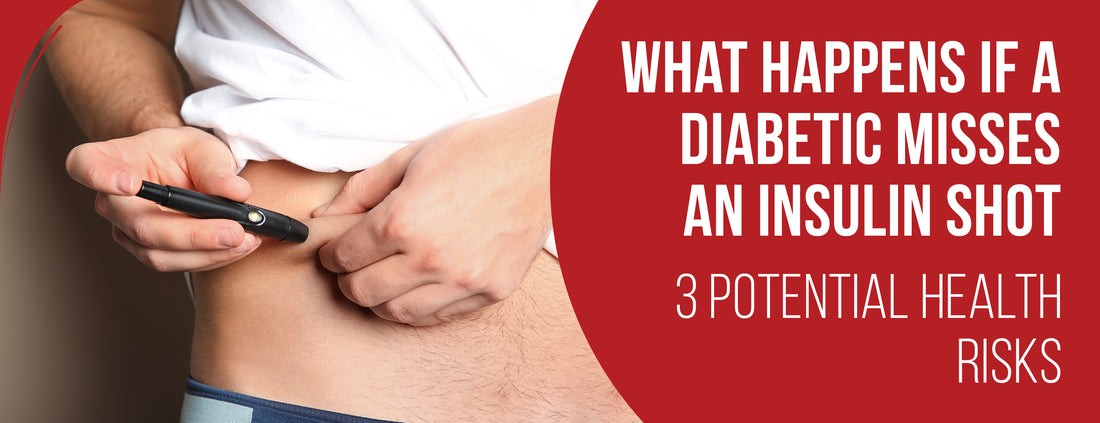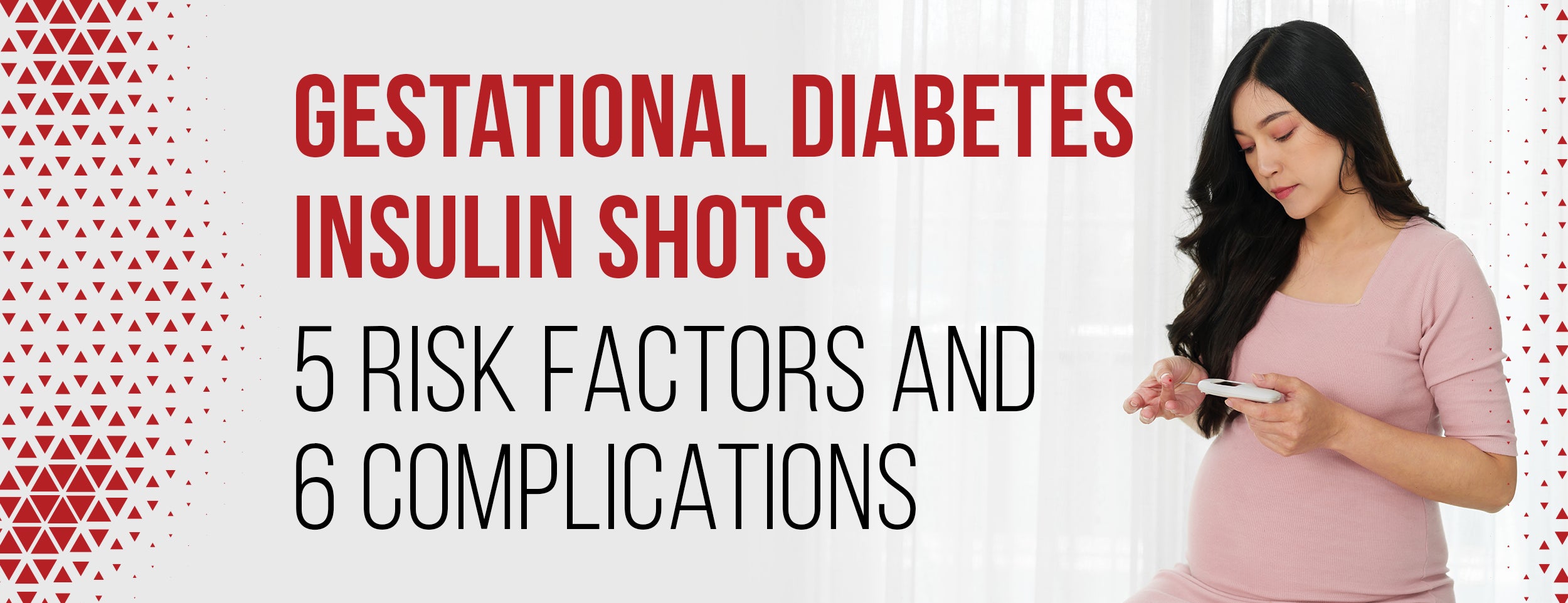A lack of insulin can also lead to infections and lead to long-term health problems. A person with no insulin production will begin to feel ill within 12 to 24 hours of their last insulin injection, depending on the duration of its effect.
Diabetes-related problems may be increased if blood glucose is consistently higher than it should be. One of the key treatments for diabetes is insulin, a hormone that regulates blood glucose levels. When a diabetic misses an insulin shot, it can have severe repercussions for their health.
In this blog post, we will explore the potential dangers of skipping insulin and what happens to the body when a diabetic misses an insulin shot.
What Happens If A Diabetic Misses An Insulin Shot: 3 Potential Health Risks

Diabetes patients who miss insulin shots can suffer significant health consequences. Skipping a dose of insulin can lead to a variety of complications. We'll delve into the effects of missing a shot on blood glucose levels and the potential dangers that arise due to high blood glucose levels.
The Significance of Insulin in Regulating Blood Glucose
Insulin plays a crucial role in regulating blood glucose levels within the body. Its primary function is facilitating glucose (sugar) entry into the body's cells for use as energy. Insulin signals the liver to store excess glucose as glycogen for later energy needs.
Glucose concentration in the bloodstream decreases as glucose enters the cells and is used for energy, prompting insulin release. The dynamic process prevents blood sugar levels from becoming too high (hyperglycemia) or too low (hypoglycemia).
Hyperglycemia, if left untreated, can lead to various complications over time. These complications may include:
- Short-Term Effects: Increased thirst, frequent urination, fatigue, blurred vision, and headaches are some immediate symptoms of high blood sugar levels.
- Long-Term Effects: Prolonged hyperglycemia can damage blood vessels and nerves, leading to serious complications such as cardiovascular disease, kidney damage, nerve damage (neuropathy), and eye problems (retinopathy).
- Impaired Healing: High blood sugar levels can impair the body's ability to heal wounds, making infections and injuries more problematic.
- Compromised Immune System: Hyperglycemia can weaken the immune system, making the body more susceptible to infections.
In summary, insulin plays a pivotal role in regulating blood glucose levels and ensuring the proper functioning of the body's cells. Missing an insulin shot can disrupt this delicate balance, causing elevated blood sugar levels and potentially leading to short-term discomfort and long-term complications for individuals with diabetes.

The Consequences of Insulin Omission on Blood Glucose Levels
When diabetics miss an insulin shot, their cells cannot absorb glucose from the bloodstream. High blood sugar levels result in hyperglycemia or high blood glucose levels. As a result of insufficient insulin, cells cannot efficiently use glucose for energy, resulting in various negative effects. When a diabetic misses an insulin shot, several significant consequences occur:
- Hyperglycemia (High Blood Sugar): Without insulin, glucose in the bloodstream cannot enter cells for energy. As a result, blood sugar levels rise rapidly, leading to hyperglycemia. This can cause various short-term and long-term health issues.
- Symptoms of Hyperglycemia: As blood sugar levels soar, individuals may experience excessive thirst, frequent urination, fatigue, blurred vision, and increased hunger.
The Potential Hazards of Elevated Blood Glucose Levels
Elevated blood glucose levels pose a difficult journey for people with diabetes. DKA causes metabolic chaos as the body desperately tries to find alternative fuel sources, turning to ketones and plunging into an acidic abyss.
Diabetic Ketoacidosis (DKA):

Diabetic Ketoacidosis (DKA) emerges as a dangerous state where the body's accelerated fat breakdown triggers the production of acidic ketones, posing an imminent threat to vital functions and underscoring the criticality of consistent insulin management.
- Fat Breakdown Overdrive: When insulin is absent, the body resorts to breaking down fat at an accelerated pace. This rapid fat breakdown leads to the production of excessive ketones.
- Ketone Formation: The liver processes the released fats into ketones as an alternative energy source. Ketones accumulate in the bloodstream, resulting in an abnormal rise in their levels.
- Acidic Blood Imbalance: Elevated ketone levels cause the blood to turn acidic, a condition known as acidosis. This shift in blood pH disrupts normal bodily functions and can be life-threatening if left untreated.
Increased Risk of Infection:
- Elevated blood glucose levels resulting from missed insulin shots can trigger Diabetic Ketoacidosis (DKA), a serious complication of high ketone levels and blood acidification.
- Infections, notably urinary tract infections and pneumonia are frequent triggers for DKA, with up to 30-50% of cases precipitated by infections.
DKA Complications:
- DKA can lead to dehydration, electrolyte imbalances, and metabolic instability, posing a significant threat to overall health.
- Timely insulin administration and infection management are crucial to prevent DKA and its potentially hazardous consequences.
People with diabetes can make informed decisions and prioritize their health management if they understand how insulin and blood glucose are related. Make sure to consult a healthcare professional for personalized guidance.
Diabetic Ketoacidosis For Diabetic Misses An Insulin Shot
Certain conditions can cause diabetic ketoacidosis in people with type 2 diabetes as well. When insulin is insufficient, the body's cells cannot effectively use glucose for energy. Therefore, fats are broken down for energy, and ketones are released as acidic byproducts. Ketones disrupt the body's acid-base balance, resulting in metabolic acidosis.
Causes of Diabetic Ketoacidosis in Diabetics Who Miss Insulin Shots

Diabetic ketoacidosis most commonly occurs when individuals miss their insulin shots or experience a significant reduction in insulin dosage. Several factors contribute to the development of DKA in these cases:
- Insulin Deficiency: The primary cause of DKA is a lack of sufficient insulin, which is necessary for glucose uptake by cells.
- Stress and Illness: Infections, illnesses, or other forms of physical stress can increase the body's demand for insulin, exacerbating the deficit.
- Missed Insulin Injections: Skipping or missing insulin injections can quickly lead to elevated blood glucose levels.
- Inadequate Monitoring: Failing to monitor blood sugar levels regularly can prevent timely intervention to prevent DKA.
- Incorrect Dosage: Errors in calculating insulin dosages can result in inadequate insulin administration.
Symptoms of Diabetic Ketoacidosis
Recognizing the symptoms of DKA is crucial for early detection and prompt medical intervention. The symptoms of DKA include:
- Fast, deep breathing: Excess acid from the blood is eliminated by increased respiration or Kussmaul breathing.
- Dry skin and mouth: Dehydration can result from high blood sugar levels, causing dryness of the skin and mouth.
- Flushed face: When the blood vessels dilate from acidosis, the skin may appear flushed.
- Fruity-smelling breath: A distinct, sweet, fruity odor in the breath arises from the production of ketones, resulting from the body breaking down fat for energy due to the lack of insulin.
- Headache: Elevated blood sugar levels and the acidic environment can contribute to headaches.
- Being very tired: The body's inability to utilize glucose efficiently for energy can cause extreme fatigue.
- Nausea and vomiting: Acidosis and high blood sugar levels can lead to gastrointestinal symptoms such as nausea and vomiting.
Monitoring blood sugar levels and adhering to insulin regimens are important for diabetics. The treatment of diabetic ketoacidosis involves insulin administration and rehydration to prevent severe complications.

Increased Risk of Infections
Diabetes patients who fail to take their insulin shots inadvertently expose themselves to infection risks. The immune system is compromised by insulin deficiency, making them more susceptible to microbial threats.
High Blood Glucose and Infection Vulnerability: Understanding the Connection:
High blood sugar levels can significantly compromise the immune system's effectiveness, rendering individuals more susceptible to infections. This vulnerability is especially pronounced in long-term diabetes cases due to peripheral nerve damage and reduced blood circulation to extremities, creating an environment conducive to infection.
Varied Infections Associated with Insulin Misses

If you skip insulin shots, you're creating an infection-prone environment. The immune system is weakened and prone to infections without proper blood sugar regulation.
- Skin Infections: Elevated blood sugar levels can impair the skin's ability to act as a barrier against pathogens, leading to skin infections like cellulitis or boils.
- Urinary Tract Infections (UTIs): Uncontrolled diabetes resulting from missed insulin doses can encourage bacterial growth in the urinary tract, triggering UTIs, which can cause discomfort and complications.
- Respiratory Infections: Unregulated glucose levels weaken diabetics' immunity, increasing their risk of respiratory infections.
- Gastrointestinal Infections: Missed insulin shots may disrupt the balance of gut bacteria, paving the way for gastrointestinal infections and digestive complications.
Potential Complications of Infections in Diabetics
The consequences of missed insulin shots in diabetics infection can trigger potential complications. Consistent insulin management can avert these additional health challenges, from compromised immune responses to delayed wound healing.
- Delayed Healing: Elevated blood sugar levels impede the body's natural healing processes, prolonging infection and wound recovery.
- Disrupted Blood Glucose Levels: Infections trigger a stress response in the body, releasing hormones that can elevate blood sugar levels further, exacerbating diabetes management challenges.
- Increased Risk of Amputations: Chronic infections in diabetics can escalate to severe complications, potentially necessitating amputations due to compromised blood flow and tissue damage.
Missing insulin doses heightens the risk of infections for diabetics due to elevated blood glucose levels, which can result in various common infections. Proper insulin management preserves overall health and prevents adverse outcomes.

Long-Term Health Problems For Diabetic Misses An Insulin Shot
Diabetes patients who skip insulin shots can suffer dangerous long-term health consequences. Diabetes can seriously affect cardiovascular health and vital organs, so understanding their gravity is imperative.
Long-Term Health Effects of Consistently High Blood Glucose:
- Untreated hyperglycemia can escalate to a critical state, potentially triggering a diabetic coma.
- Consistently elevated blood glucose levels are a primary driver of long-term health complications in individuals with diabetes.
- Chronic health issues can occur even if your blood sugar is not severely elevated.
- Over time, consistently high blood glucose levels can lead to severe health complications that impact the quality of life and necessitate ongoing medical management.
Long-term Health Problems For Diabetics Who Consistently Miss Insulin Shots Include:
Long-term health problems are emerging, including blood sugar fluctuations, nerve pain, and diabetic complications.
Cardiovascular Disease:

A risk of cardiovascular disease looms ominously for diabetics who miss insulin shots chronically. The heart and vascular system require unwavering attention and intervention to avoid dire consequences.
- Diabetes and Heart Disease Link: Diabetes increases the risk of developing cardiovascular disease. Cardiovascular problems can be caused by diabetes and high blood pressure.
- Elevated Risk Factors: Diabetics often have high blood pressure and cholesterol, which make them more likely to get heart disease. These factors contribute to a greater susceptibility to heart attacks and strokes.
- Insulin Missed Impact: Missing an insulin shot can result in uncontrolled blood sugar levels in a diabetic. Leaving this hyperglycemia untreated can worsen heart disease risk factors.
Eye Damage:
A diabetic's eyesight is at risk when they miss an insulin shot. Insulin management is crucial to preventing eye damage and diabetic retinopathy.
- Diabetic retinopathy: A missed insulin shot can get your blood sugar out of control, worsening diabetic retinopathy.
- Blood vessel damage: Damaged retinal blood vessels can leak or become blocked due to high blood sugar.
- Vision loss: Untreated diabetic retinopathy can result in vision loss and even blindness over time.
Kidney Damage:

Insulin neglect can strain the delicate filtration system of the kidneys, leading to renal complications over time.
- Increased Urinary Albumin Excretion: Chronically missing insulin shots in diabetics can lead to hyperinsulinemia, which selectively increases urinary albumin excretion. In this case, the kidneys may release more albumin into the urine.
- Renal Hemodynamic Changes: When insulin is absent in diabetics, renal hemodynamics are affected, even though insulin generally has little impact on healthy people. This can affect blood flow within the kidneys, potentially causing damage over time.
- Glomerular Filtration Rate (GFR): Insulin shots indirectly affect the glomerular filtration rate (GFR), which measures kidney function.
Nerve Damage:
- Nerve Damage Risk: Missing insulin shots can lead to insulin dysregulation and neuropathic changes in sensory neurons. As a result, the risk of sensory nerve damage increases, which is highly prevalent in prediabetes, type 1, and type 2 diabetes.
- Neuropathy Development: Neuropathy, a condition characterized by nerve damage, can result from inadequate insulin levels or improper insulin management. If people with diabetes miss their insulin shots consistently, it can cause sensory disturbances such as tingling, numbness, and pain in the extremities.
Maintaining a consistent insulin therapy regime is essential to control diabetes and prevent long-term health problems. You can prevent serious health complications by following prescribed treatment plans.

Conclusion:
Managing diabetes requires a commitment to take medications and make lifestyle changes as needed. Skipping insulin can have significant consequences, and staying on track with your medication regimen is essential.
Symptoms other than insulin resistance may indicate the need to see your healthcare provider. By understanding the risks of missing an insulin shot, you can take steps to lower your risk of complications and continue living your best life with diabetes.














